Follow Us
Browse
Services
The Pusher Distribution
Paris (France)
+33(0)952535539
ALL RIGHTS RESERVED © CG
Open today: 00:00 - 23:30
1 / 0



Artists
Labels
Catno
INF003
Formats
1x Vinyl 2LP
Release date
Feb 26, 2024
Genres
Styles
Established in 1948 by César Roldán, Discomoda is one of the earliest record labels of Venezuela and the oldest family operated label in the country. Home to one of the most complete folkloric and popular music catalogues of Venezuela, the label also invested heavily in Afro-Caribbean and tropical rhythms that became popular in the 60s and 70s.
In the 1960s and before the Salsa era truly kicked off, Venezuela had a significant dance orchestra and big band movement. Unlike local record competitors dedicated to selling foreign productions, Discomoda achieved its leading position by recording the most important national bands, including Los Megatones de Lucho, Orquesta Sonoramica and Super Combo Los Tropicales; all featured in this compilation.
Later on, surrounding the festivities for the 400th anniversary of Caracas in 1967, the word "Salsa", which had been recently coined by famed radio host Phidias Danilo Escalona, was formalized to identify an Afro-Caribbean musical style with growing popularity in Venezuela and beyond. By then, the country was among the top 20 music markets in the world, with the local label Discomoda leading the way, responsible for one out of every five records sold in the country.
With the prolonged celebrations approaching due to the 400 years of the city, Discomoda and other labels began to capitalize on this new musical style by betting on both established and new local bands, such as Nelson y sus Estrellas, Los Kenya, Principe y su Sexteto and Los Satélites. As a result, this would kick off what could be considered a golden era of Salsa in Venezuela and which lasted until the mid-70s.
As we approach the 80s and with the emergence of new musical styles and bigger multi-national record labels funded by larger pockets, a lot of the previously popular bands begin to disband or choose to leave the country. Nonetheless, a few artists, like Rodrigo Mendoza, La Renovación and Grupo Yakambu, were still pushing out quality music.
We are thrilled and honored to celebrate one of Venezuela's and, equally, Latin America's most significant record labels, and to share a slice of their enduring influence in advancing Venezuelan-made Salsa music.
A1
Los Megatones de Lucho - El tumbaleque
A2
Sonora Venezuela - Pero en Caracas
A3
Los Megatones de Lucho - Muñeca
A4
Al Ramos y su Orquesta - El candidato
A5
Orquesta Sonoramica - Oye como suena
A6
Microbanda Marabina - Maracaibo
B1
Principe y su sexteto - Salsa de Guaguancó
B2
Genaro y sus All Stars - Mambo tema
B3
Orquesta Universidad - Atado a un recuerdo
B4
Los Kenya - No salgas de tu barrio
B5
Nelson y sus Estrellas - Disparo goajira
C1
Los Kenya - Pa' Puerto Rico
C2
Principe y su sexteto - Analiza
C3
Supercombo Los Tropicales - Juana Guaguancó
C4
Los Satélites - El tostao
C5
Johnny Sedes y su Orquesta - Algo diferente
D1
Los Satélites - Fiesta en Venezuela
D2
Rodrigo Mendoza - Lija
D3
La Renovación - Mi redención
D4
Los Blanco - Corta el bonche
D5
Grupo Yakambu - Si eres tú
The Pusher Distribution
Paris (France)
+33(0)952535539
ALL RIGHTS RESERVED © CG